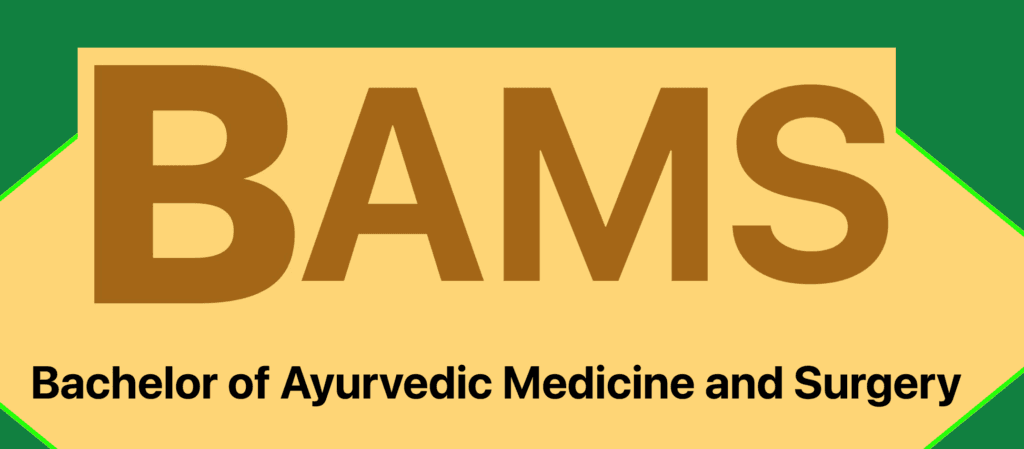
Introduction
BAMS Full Form, in recent years, as people grow more health-conscious and lean toward traditional and holistic medicine, the field of Ayurveda has gained popularity. One of the prominent courses for pursuing a career in Ayurveda in India is BAMS, which stands for Bachelor of Ayurvedic Medicine and Surgery. This article will explore the BAMS course, including its curriculum, eligibility criteria, career opportunities, and answers to some frequently asked questions. Let’s dive into what makes BAMS an attractive and rewarding career choice for aspiring healthcare professionals.
What is BAMS?
The full form of BAMS is Bachelor of Ayurvedic Medicine and Surgery. It is an undergraduate degree program focusing on the ancient Ayurvedic medical system. BAMS integrates both modern medicine and traditional Ayurveda, offering a balanced approach to healthcare. Ayurveda is one of the oldest medical sciences in the world, originating in India thousands of years ago. BAMS aims to bridge this ancient knowledge with contemporary medical practices, enabling graduates to treat various diseases naturally and holistically.
Key Aspects of the BAMS Course
1. Course Duration and Structure
The BAMS course typically lasts 5.5 years, including 4.5 years of academic study and a one-year mandatory internship.
The curriculum is divided into multiple stages, often focusing on different systems of medicine, including anatomy, physiology, pharmacology, pathology, and more, but all within the framework of Ayurvedic concepts.
2. Eligibility Criteria
To pursue BAMS, students must complete their 10+2 education with a strong background in science subjects, particularly Biology, Chemistry, and Physics.
They must also score well on the National Eligibility cum Entrance Test (NEET), as admission to BAMS programs is often based on NEET rankings.
3. Subjects in the BAMS Curriculum
The course curriculum in BAMS covers a wide range of subjects, integrating Ayurvedic concepts with modern medicine. Key areas include:
Sharir Rachana (Anatomy)
Sharir Kriya (Physiology)
Dravyaguna Vigyan (Pharmacology of Medicinal Plants)
Swasthavritta (Social and Preventive Medicine)
Agadtantra (Toxicology)
Kayachikitsa (Internal Medicine)
Shalya Tantra (Surgery)
Besides theoretical knowledge, students are required to gain practical experience in the field, working in Ayurvedic hospitals or clinics during their internship.
Why Choose a Career in BAMS?
There are several reasons why a career in BAMS is an attractive option, particularly as people become more inclined toward natural and holistic healing.
1. Growing Demand for Alternative Medicine
With increased awareness of the side effects of modern medicine, people are exploring alternatives. Ayurveda is often seen as a gentler approach that aims to treat the root cause of diseases.
2. Diverse Career Opportunities
BAMS graduates have numerous career paths available to them, including:
Practicing as an Ayurvedic Doctor: Many BAMS graduates establish their own clinics or work in Ayurvedic hospitals.
Research and Development: BAMS degree holders can engage in research, working on clinical studies for Ayurvedic medicine.
Healthcare Administration: Some choose to enter the management side, taking roles in Ayurvedic pharmaceutical companies or healthcare facilities.
Government Sector Jobs: Graduates may qualify for roles in government-run Ayurvedic hospitals, dispensaries, and research institutes.
3. High Earnings and Job Satisfaction
A career in Ayurveda, particularly if you establish a successful practice, can be highly lucrative. Additionally, the satisfaction of helping patients heal holistically is a major advantage for those passionate about healthcare.
Top Colleges for BAMS in India
India has several prestigious institutions offering BAMS programs. Some top colleges include:
Banaras Hindu University (BHU), Varanasi
National Institute of Ayurveda (NIA), Jaipur
Gujarat Ayurved University, Jamnagar
Ayurvedic and Unani Tibbia College, Delhi University
Career Prospects and Job Roles After BAMS
After completing the BAMS course, graduates have several career options:
Ayurvedic Doctor: Practicing in private clinics or working in Ayurvedic hospitals.
Pharmacist: Engaging in the production and formulation of Ayurvedic medicines.
Therapist or Consultant: Offering Ayurvedic therapies or consulting at wellness centers and spas.
Researcher: Conducting studies on the effectiveness of Ayurvedic treatments and formulating new medicines.
Lecturer: Teaching Ayurveda in educational institutions.
Advantages of Pursuing BAMS
Holistic Approach: Ayurveda’s holistic approach ensures physical, mental, and spiritual well-being.
Flexible Career Paths: From clinical practice to research and administration, the field offers various career options.
Contributing to Society: Ayurveda has the potential to offer natural and less invasive healthcare options, especially for chronic conditions.
FAQs on BAMS
1. What is the full form of BAMS?
BAMS stands for Bachelor of Ayurvedic Medicine and Surgery.
2. Is NEET required for admission to the BAMS program?
Yes, NEET is mandatory for admission to BAMS programs, as it ensures a standard qualification level for students entering the field of medicine.
3. What are the career options after BAMS?
After BAMS, graduates can work as Ayurvedic doctors, therapists, researchers, pharmacists, or lecturers. They can also pursue further studies, such as MD in Ayurveda or MSc in related fields.
4. Can a BAMS doctor practice modern medicine?
In some Indian states, BAMS doctors are allowed to practice certain aspects of modern medicine, although they primarily focus on Ayurvedic treatments. It is advisable to check the regulations in your specific region.
5. How does BAMS compare to MBBS?
While both BAMS and MBBS are medical degrees, BAMS focuses on Ayurvedic medicine, emphasizing natural and herbal treatments, whereas MBBS focuses on modern allopathic medicine. The choice between the two depends on the student’s interest in traditional versus modern approaches.
Conclusion
With the increasing popularity of natural and holistic treatments, BAMS is emerging as an important degree for those passionate about alternative medicine. By combining traditional Ayurvedic knowledge with a modern scientific approach, BAMS graduates can make a significant impact on people’s health and well-being. For those interested in a career that promotes natural healing and wellness, BAMS offers a promising path filled with opportunities.
